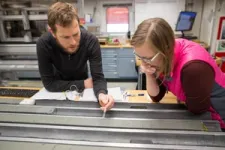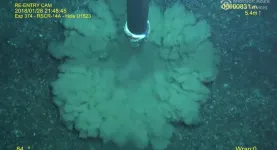(Press-News.org) Scientists have discovered the cause of giant underwater landslides in Antarctica which they believe could have generated tsunami waves that stretched across the Southern Ocean.
An international team of researchers has uncovered layers of weak, fossilised and biologically-rich sediments hundreds of metres beneath the seafloor.
These formed beneath extensive areas of underwater landslides, many of which cut more than 100metres into the seabed.
Writing in Nature Communications, the scientists say these weak layers – made up of historic biological material – made the area susceptible to failure in the face of earthquakes and other seismic activity.
They also highlight that the layers formed at a time when temperatures in Antarctica were up to 3°C warmer than they are today, when sea levels were higher and ice sheets much smaller than at present.
With the planet currently going through a period of extensive climate change – once again including warmer waters, rising sea levels and shrinking ice sheets – researchers believe there is the potential for such incidents to be replicated.
Through analysing the effects of past underwater landslides, they say future seismic events off the coast of Antarctica might again pose a risk of tsunami waves reaching the shores of South America, New Zealand and South East Asia.
The landslides were discovered in the eastern Ross Sea in 2017 by an international team of scientists during the Italian ODYSSEA expedition.
Scientists revisited the area in 2018 as part of the International Ocean Discovery Program (IODP) Expedition 374 where they collected sediment cores extending hundreds of meters beneath the seafloor.
By analysing those samples, they found microscopic fossils which painted a picture of what the climate would have been like in the region millions of years ago and how it created the weak layers deep under the Ross Sea.
The new study was led by Dr Jenny Gales, Lecturer in Hydrography and Ocean Exploration at the University of Plymouth, and part of IODP Expedition 374.
She said: “Submarine landslides are a major geohazard with the potential to trigger tsunamis that can lead to huge loss of life. The landslides can also destroy infrastructure including subsea cables, meaning future such events would create a wide range of economic and social impacts. Thanks to exceptional preservation of the sediments beneath the seafloor, we have for the first time been able to show what caused these historical landslides in this region of Antarctica and also indicate the impact of such events in the future. Our findings highlight how we urgently need to enhance our understanding of how global climate change might influence the stability of these regions and potential for future tsunamis.”
Professor Rob McKay, Director of the Antarctic Research Centre at Victoria University of Wellington and co-chief scientist of IODP Expedition 374, added: “The main aim of our IODP drilling project in 2018 was to understand the influence that warming climate and oceans have had on melting Antarctica’s ice sheets in the past in order to understand its future response. However, when Dr Gales and her colleagues on board the OGS Explora mapped these huge scarps and landslides the year before, it was quite a revelation to us to see how the past changes in climates we were studying from drilling were directly linked to submarine landslide events of this magnitude. We did not expect to see this, and it is a potential hazard that certainly warrants further investigation.”
Laura De Santis, a researcher at the National Institute of Oceanography and Applied Geophysics in Italy, and also co-chief scientist of IODP Expedition 374, said: "The sediment cores we analysed were obtained as part of IODP, the international seafloor scientific drilling project that has been active in the field of geoscience for over 50 years. The project aims to explore the history of planet Earth, including ocean currents, climate change, marine life and mineral deposits, by studying sediments and rocks beneath the seafloor.”
Jan Sverre Laberg, from The Arctic University of Norway, Tromsø, said: “Giant submarine landslides have occurred both on southern and northern high latitude continental margins, including the Antarctic and Norwegian continental margins. More knowledge on these events in Antarctica will also be relevant for submarine geohazard evaluation offshore Norway.”
Dr Amelia Shevenell, Associate Professor of Geological Oceanography at University of South Florida, College of Marine Science, said: “This study illustrates the importance of scientific ocean drilling and marine geology for understanding both past climate change and identifying regions susceptible to natural hazards to inform infrastructure decisions. Large landslides along the Antarctic margin have the potential to trigger tsunamis, which may result in substantial loss of life far from their origin. Further, national Antarctic programs are investigating the possibility of installing submarine cables to improve communications from Antarctic research bases. Our study, from the slope of the Ross Sea, is located seaward of major national and international research stations, indicating that marine geological and geophysical feasibility studies are essential to the success of these projects and should be completed early in the development process, before countries invest in and depend on this communication infrastructure.”
END
Past climate change to blame for Antarctica’s giant underwater landslides
2023-05-18
ELSE PRESS RELEASES FROM THIS DATE:
Time of day may determine the amount of fat burned by cold exposure
2023-05-18
Short-term exposure to cold temperatures activates brown fat that burns calories and has become an attractive target to promote cardiometabolic health. Now new research being presented at this year’s European Congress on Obesity (ECO) in Dublin, Ireland (17-20 May) suggests that this biological response differs depending on the time of day and in men and women.
The preliminary study by Dr Mariëtte Boon from Leiden University Medical Center in the Netherlands and colleagues, suggests that cold exposure in ...
Nearly half of adolescents using semaglutide in trial dropped below the clinical cut-off for obesity
2023-05-18
DUBLIN—A new secondary analysis of the STEP TEENS trial presented at this year’s European Congress on Obesity (ECO 2023, Dublin 17-20 May) and published in the journal Obesity shows that almost half (45%) of the adolescents assigned to semaglutide in the trial managed to lose enough weight to drop below the clinical cutoff for obesity.
The study, led by Aaron S. Kelly, PhD, co-director of the Center for Pediatric Obesity Medicine at the University of Minnesota, Minneapolis, and colleagues, also showed almost three quarters (74%) moved down by at least one weight category.
The full STEP TEENS trial, published in 2022 in the New England Journal ...
Women and non-white groups still missing out on top US research prize
2023-05-18
The number of women and non-white people in academic medicine and biomedical research continues to increase, yet the proportion of women among Lasker Award recipients has not changed in more than 70 years, finds a study published by The BMJ today.
And only one non-white woman was identified as having received a Lasker Award over the course of seven decades, the findings show.
The researchers say these results are difficult to reconcile given the ever increasing number of qualified scientists from diverse backgrounds, and they call for more transparency around ...
Prostate cancer ‘test by request’ policies drive overdiagnosis and inequity with minimal benefit, argue experts
2023-05-18
Most high income countries, including the UK, do not have a national prostate cancer screening programme, but instead allow men without symptoms to get a prostate-specific antigen (PSA) test if they wish, after talking to their doctor.
But experts writing in The BMJ today argue that these shared decision policies have led to high rates of PSA testing and clear medical harm, with minimal benefit and inequity.
Andrew Vickers and an international group of colleagues argue that high income countries should either implement a comprehensive risk based approach ...
Tonsillectomy both clinically and cost effective for adults
2023-05-18
Scientists say tonsil removal is both clinically and cost effective for adults who get recurrent severe sore throats.
The biggest study of its kind, carried out by Newcastle University, revealed that patients who had a tonsillectomy had 50% less sore throats over two years, compared to patients who did not undergo tonsillectomy. Publishing today (17 May) in The Lancet, the study was funded by the National Institute for Health and Care Research (NIHR).
Experts also found that a tonsillectomy for those aged 16 years and over was cost effective ...
New measure of quality life for patients with locally recurrent rectal cancer
2023-05-18
This collaborative study between researchers in the UK and Australia is a huge step towards aligning outcome reporting with patient priorities in advanced cancer settings. The study, published in the journal eClinical Medicine (The Lancet Discovery Science), details the development, testing and analysis of this design-specific measure to assess quality of life in patients with recurrent rectal cancer, regardless of treatment intent.
This new measure – called the LRRC–QoL – consists of nine multi-item scales (healthcare services, psychological ...
New analysis of prisoner healthcare highlights risks to patient safety
2023-05-18
Substantive changes are needed to improve patient safety in prisons, according to a new study published by the Journal of the Royal Society of Medicine (JRSM) and funded by the National Institute for Health and Care Research (NIHR). Practical changes such as timely access to healthcare services and better processes to mitigate medication-related harm should be prioritised, according to the researchers.
In the first nationwide analysis of patient safety incidents in prisons in England, researchers found that security, staffing constraints and the high turnover of prisoners are among the main barriers to the safe delivery of healthcare ...
African Killifish could hold secrets to reversing muscle ageing
2023-05-18
As we age, our muscles start to waste. Called sarcopenia, it happens to us all, yet no one has ever understood why and how it happens. Now new research from the Australian Regenerative Medicine Institute (ARMI) at Monash University has used a surprising animal model – the African killifish – to reveal that towards the end of life, our muscles actually reverse to an “early-life” state, slowing mortality. This finding may provide a clue to slowing, halting or even reversing age-related loss of muscle mass and strength.
The research, published ...
Accelerated Christian Education textbooks used in UK schools deny human-caused climate change
2023-05-18
UCL Press Release
Under embargo until Thursday 18th May, 01:00 UK time / Wednesday 17th May, 20:00 Eastern US time
Peer reviewed | Literature review | People
One of the world’s largest fundamentalist Christian education groups is teaching its students climate change denial as fact, and still presents the theory of evolution as an ‘absurd and discredited’ conspiracy theory, finds a report by UCL researchers.
Accelerated Christian Education (ACE) is one of the world’s biggest providers of creationist science materials, consisting of reading programmes and a core ...
First observed radio waves from a type Ia supernova
2023-05-18
For the first time, astronomers have observed radio waves emitted by a Type Ia supernova, a type of explosion originating from a white dwarf star. This provides important clues to understand how white dwarfs explode.
A Type Ia (One-A) supernova is the nuclear explosion of a white dwarf star. This type of supernova is well known; these supernovae are used by astronomers to measure cosmological distances and the expansion of the Universe. But the explosion mechanism of Type Ia supernovae is not well understood. Solitary white dwarfs don’t explode, so it is thought that mass accretion from a neighboring companion ...





